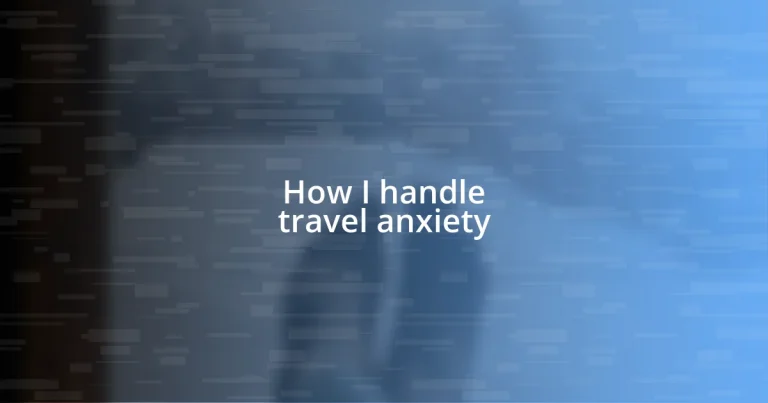Key takeaways:
- Travel anxiety often arises from fears of the unknown and discomfort with being out of one’s comfort zone, but acknowledging it can lead to personal growth.
- Preparation techniques, such as creating checklists, researching destinations, and practicing mindfulness, can alleviate anxiety and enhance travel experiences.
- Seeking professional help is sometimes necessary when self-help strategies are insufficient, providing valuable tools to manage anxiety and transform travel into a more enjoyable experience.
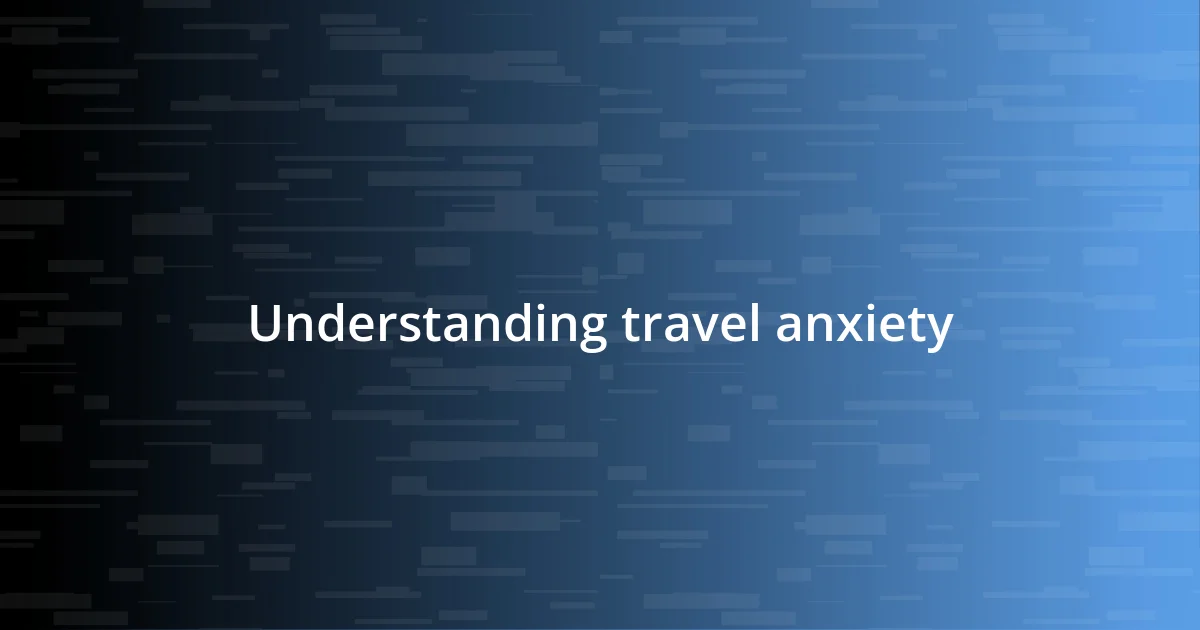
Understanding travel anxiety
Travel anxiety is a real and often underestimated experience. I remember the first time I had to board a plane alone; I felt my heart racing and my palms sweating long before take-off. It made me wonder—why does this excitement of visiting new places sometimes translate into such overwhelming fear?
Understanding the roots of travel anxiety can be complex. It often stems from a fear of the unknown, a dislike for being out of my comfort zone, or even worries about missing out on life back home. I’ve found myself wrestling with these feelings many times, especially when I thought about all the things that could go wrong, like lost luggage or missed connections—has anyone else felt that tightening in their chest at those thoughts?
I often find that simply acknowledging my travel anxiety brings relief. It’s okay to feel this way; it doesn’t make me any less adventurous. When I embrace it, I can focus on preparing for the journey ahead, turning those anxious moments into a chance to learn more about myself and what helps me relax. Isn’t it interesting how our fears can also lead to personal growth?
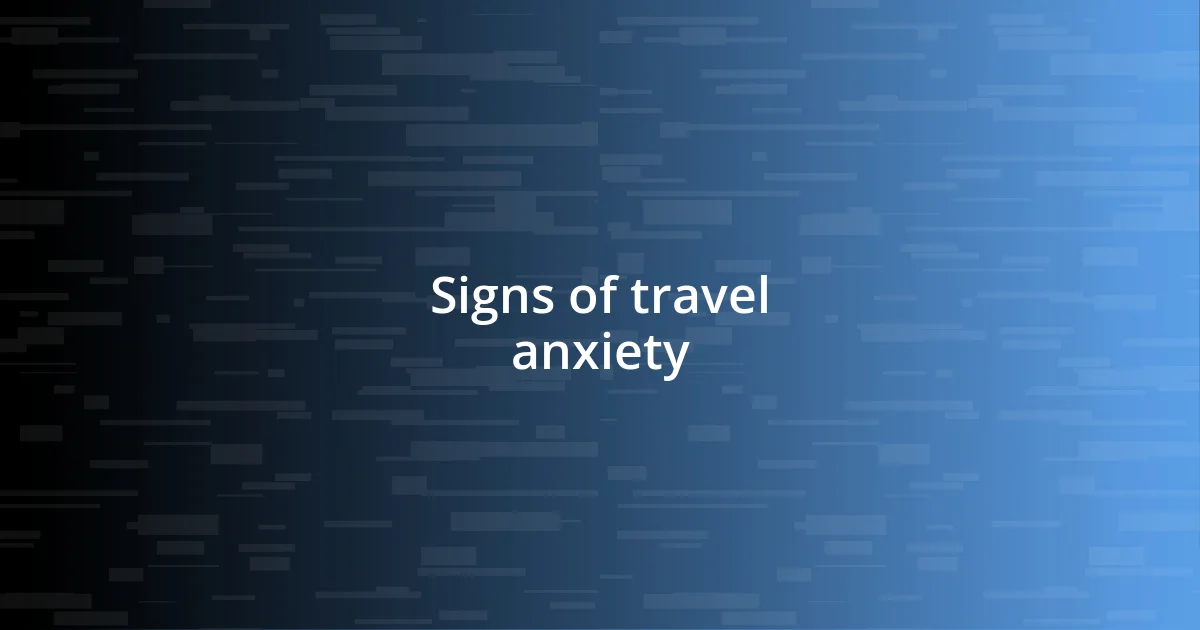
Signs of travel anxiety
When I experience travel anxiety, it often manifests in physical signs that are hard to ignore. For instance, I’ve found myself feeling unusually tense, with tightness in my shoulders and neck, as the travel date approaches. It’s as if my body is preparing for battle instead of a trip.
Here are some common signs of travel anxiety that I’ve encountered:
- Increased heart rate or palpitations
- Sweaty palms or trembling hands
- Difficulty sleeping the night before departure
- Persistent negative thoughts about the travel experience
- Feeling nauseous or experiencing stomach discomfort
- Avoidance of packing or making travel arrangements
Sometimes, it’s the mental signs that are even harder to recognize. I recall feeling a nagging sense of dread that made me question whether I should go at all. My mind races with “what if” scenarios, creating worry levels that feel disproportionate to the reality of the situation. Each of these experiences seems to amplify the anxiety, making me even more aware of its presence.
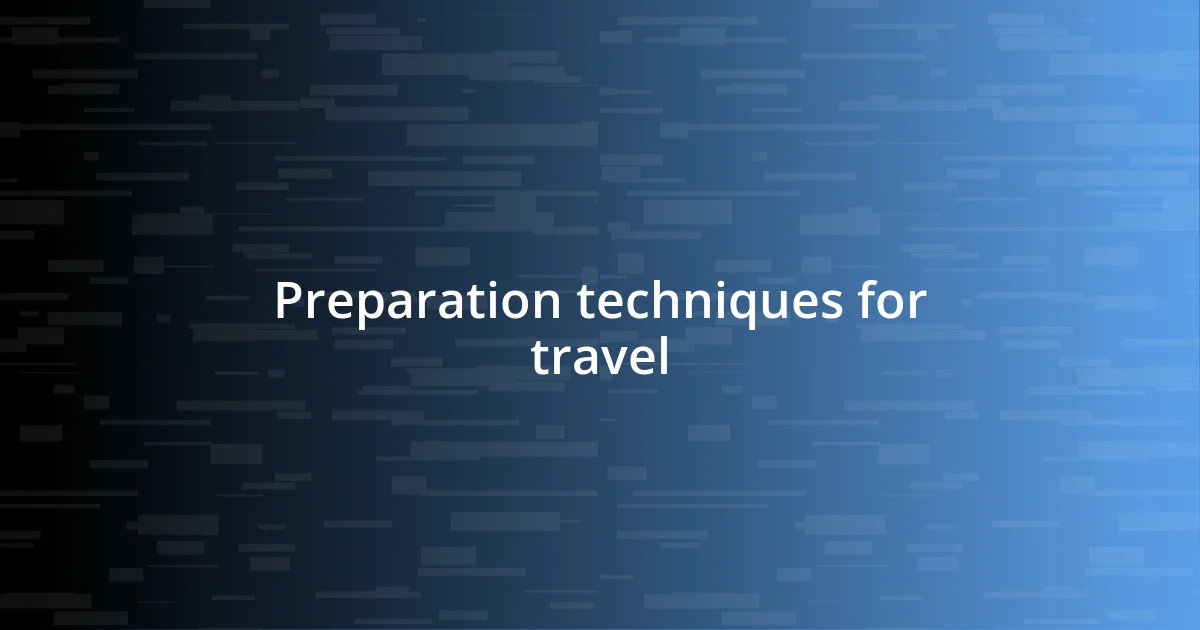
Preparation techniques for travel
Preparation is key when managing travel anxiety. I’ve realized that creating a solid plan can ease much of the worry beforehand. For instance, I always jot down a travel checklist. It helps me visualize everything from packing essentials to itinerary details. This simple act transforms the chaos in my mind into manageable tasks—it feels almost therapeutic. Have you ever tried making a list before a big trip? I find it strangely satisfying to check off each item.
As my travel date approaches, I also dedicate time to research my destination. Knowing what to expect helps demystify unfamiliar surroundings. A few months ago, when I was preparing for a trip to a foreign country, I spent time learning about local customs and transportation options. This not only calmed my nerves but also enriched my overall travel experience. It was like gaining a friend in a distant land, and I felt more connected rather than anxious.
Another technique I’ve embraced is practicing mindfulness and relaxation exercises before traveling. I remember sitting quietly in my hotel room before a big day of sightseeing, focusing on my breath and letting go of any lingering worries. It changed my entire outlook, converting pre-trip jitters into excitement. Those moments of peace can be invaluable when your mind races ahead. Don’t underestimate the power of just taking a few breaths, right?
| Preparation Technique | Description |
|---|---|
| Travel Checklist | A detailed list to ensure nothing is forgotten, providing a sense of control. |
| Research | Learning about the destination to reduce uncertainty and enhance the experience. |
| Mindfulness Exercises | Practicing relaxation techniques to calm pre-travel jitters. |
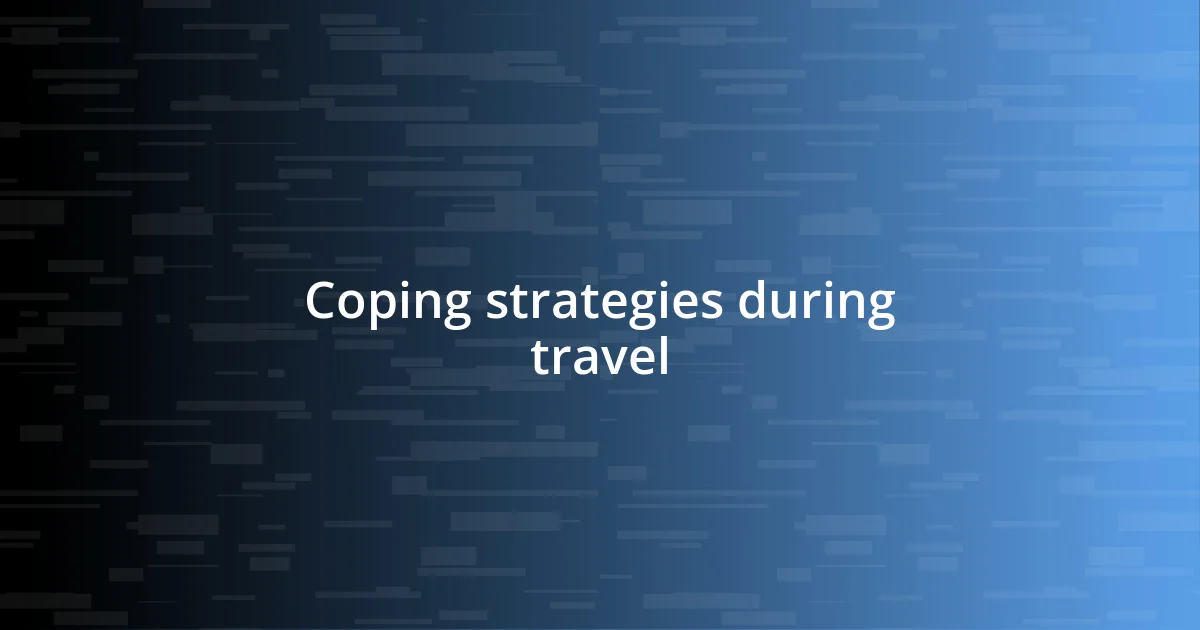
Coping strategies during travel
When the travel day arrives, I find it really helps to stick to a routine. On one particular trip, I woke up early to go for a quick jog. The familiar rhythm of my feet hitting the ground paired with the fresh morning air significantly eased my nerves. It’s amazing how something as simple as exercise can anchor you when anxious thoughts swirl around your mind, don’t you think?
Once I’m at the airport or train station, I often bring along a comfort item—something that brings me peace, like a favorite book or a playlist filled with calming music. I remember one trip where I immersed myself in a novel while waiting for my flight, losing track of time and easing into a more relaxed state. This small distraction made the wait far more enjoyable and less daunting. Have you found any little rituals that ground you during travel?
Throughout the journey, I consciously remind myself to focus on the present moment. I practice gratitude by acknowledging what excites me about the trip, like tasting local food or exploring new landscapes. For instance, on a recent trip to Italy, I delighted in the thought of wandering through cobblestoned streets with a creamy gelato in hand. Fixating on the anticipation of new experiences truly helped to overshadow any lingering anxiety. How do you channel your excitement when you’re on the move?
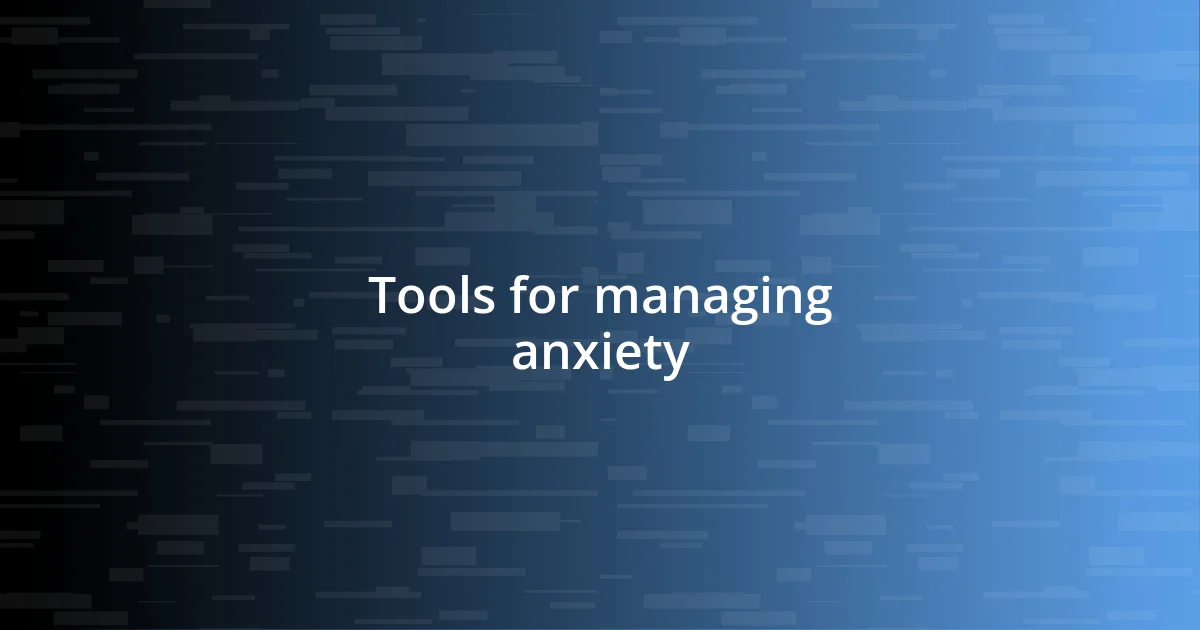
Tools for managing anxiety
When anxiety creeps in during travel, I find that grounding techniques can create a sense of calm. One tool I often utilize is the “5-4-3-2-1” exercise, which involves identifying five things I see, four things I can touch, three things I hear, two things I smell, and one thing I can taste. I remember sitting at a bustling train station, and while chaos surrounded me, this simple activity snapped me back to the present, reminding me that I was safe and in control. Have you tried a grounding exercise like this to redirect your thoughts?
Another effective tool I rely on is journaling, and it works wonders for my travel anxiety. I regularly bring a small notebook with me, where I jot down my feelings and experiences, especially before and after a flight. Just last month, after a particularly nerve-wracking flight, I scribbled about my feelings in the airport lounge. This act of writing not only helped me process my emotions but provided clarity and relief. Writing can often turn the noise in your head into a narrative you can understand. Have you ever felt the weight lift off your shoulders after putting pen to paper?
Finally, practicing deep breathing techniques is a go-to strategy I swear by. When faced with travel stress, I often take a moment to inhale deeply for four counts, hold for seven, and exhale for eight. I recall a time at a crowded airport gate when I felt overwhelmed. After just a few cycles of deep breathing, my heart rate slowed, and my perspective shifted. Breathing like this reminds me that I can find calmness amidst chaos, and it’s a tool I wish everyone would try. Do you have a favorite way to find tranquility in stressful moments?

Reflection and analysis after travel
Reflecting on my travels often brings a sense of clarity that I didn’t fully appreciate during the journey. After returning from a road trip last summer, I took some quiet time to think about the places I visited and the people I met. Writing about those experiences afterward helped solidify memories and allowed me to see how overcoming travel anxiety opened doors to new friendships and unforgettable moments. Have you ever considered how reflecting on your travels can enhance your appreciation for the experiences?
I found that analyzing my feelings post-trip is just as enlightening. For instance, after a brief but intense trip to a bustling city, I realized that the anxiety I felt initially was more about the fear of missing out on the adventures waiting for me than the travel itself. This revelation nearly knocked the breath out of me. I had spent so much time worrying that I didn’t fully embrace all the excitement around me. Isn’t it wild how perception can shape our experiences?
Moreover, I’ve noticed that sharing my travel stories helps me process my emotions even further. Discussing my reflections with friends or on a blog can turn mere memories into meaningful lessons. Recently, I recounted a challenging travel experience with a friend who had similar anxiety, which not only strengthened our bond but also provided insights into coping strategies we hadn’t considered before. Have you ever shared your travel stories, only to discover that they resonated with others on a deeper level?

Seeking professional help if needed
Seeking professional help is sometimes an essential step in managing travel anxiety. There were moments during my travel journey when my coping strategies just weren’t enough, and I felt like I was stuck in a loop of worry. After a particularly distressing trip where I struggled to step outside a busy terminal, I decided to meet with a therapist. That consultation opened my eyes to new techniques and gave me the tools to manage my anxiety more effectively. Have you ever felt that talking to someone could lighten the burden you carry during travels?
It’s crucial to recognize the signs when self-help strategies fall short. I vividly remember preparing for a trip that I’d been looking forward to, only to be paralyzed by panic about the flight. At that moment, seeking professional guidance was a turning point. A counselor helped me unpack the root of my fears and allowed me to embark on my travels with a renewed sense of courage. Isn’t it interesting how the right support can transform stress into excitement?
Engaging with professionals doesn’t need to be intimidating; it’s an empowering experience that can pave the way for personal growth. My sessions not only equipped me with tools tailored to my specific concerns but also reinforced the idea that seeking help is a sign of strength. I discovered new ways to approach travel, turning what was once a source of anxiety into an enriching adventure. Have you ever considered how speaking to someone might shift your perspective and enhance your travel experiences?












